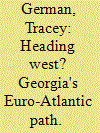| Srl | Item |
| 1 |
ID:
138951


|
|
|
|
|
| Summary/Abstract |
Events in Ukraine in 2014 are likely to transform the presence and role of western institutions such as NATO in the post-Soviet area. The crisis has starkly revealed the limits of their influence within Russia's ‘zone of privileged interest’, as well as the lack of internal unity within these organizations vis-à-vis relations with Moscow and future engagement with the area. This will have long-term implications for the South Caucasus state of Georgia, whose desire for integration into the Euro-Atlantic community remains a key priority for its foreign and security policy-makers. This article examines the main motivators behind Georgia's Euro-Atlantic path and its foreign policy stance, which has remained unchanged for over a decade despite intense pressure from Russia. It focuses on two aspects of Georgia's desire for integration with European and Euro-Atlantic structures: its desire for security and the belief that only a western alignment can guarantee its future development, and the notion of Georgia's ‘European’ identity. The notion of ‘returning’ to Europe and the West has become a common theme in Georgian political and popular discourse, reflecting the belief of many in the country that they are ‘European’. This article explores this national strategic narrative and argues that the prevailing belief in a European identity facilitates, rather than supersedes, the central role of national interests in Georgian foreign policy.
|
|
|
|
|
|
|
|
|
|
|
|
|
|
|
|
| 2 |
ID:
138746


|
|
|
|
|
| Summary/Abstract |
The Obama administration is often criticized for not having a strategic vision. After more than six years in office, a high expectation that was widely shared around the globe seems to have nearly evaporated. Many see the “disorder” the world is facing today as partly a result of a lack of vision from the White House. You could make a case that the emergence of the Islamic State (IS) and other “violent extremism” in the Middle East and beyond, Russia's aggression in Ukraine, chaos in Syria, China's assertive moves in the East China Sea and South China Sea, and so forth, are results, direct and indirect, of a perceived vacuum created by “American withdrawal.” However, the Obama administration's understanding of the world has been surprisingly positive and constant. This paper will argue that Obama administration in fact has a core world view, based on a new self-image of the United States, and that the issue is not whether the administration lacks a vision; rather the focus should be on the vision itself and the execution of that vision.
|
|
|
|
|
|
|
|
|
|
|
|
|
|
|
|